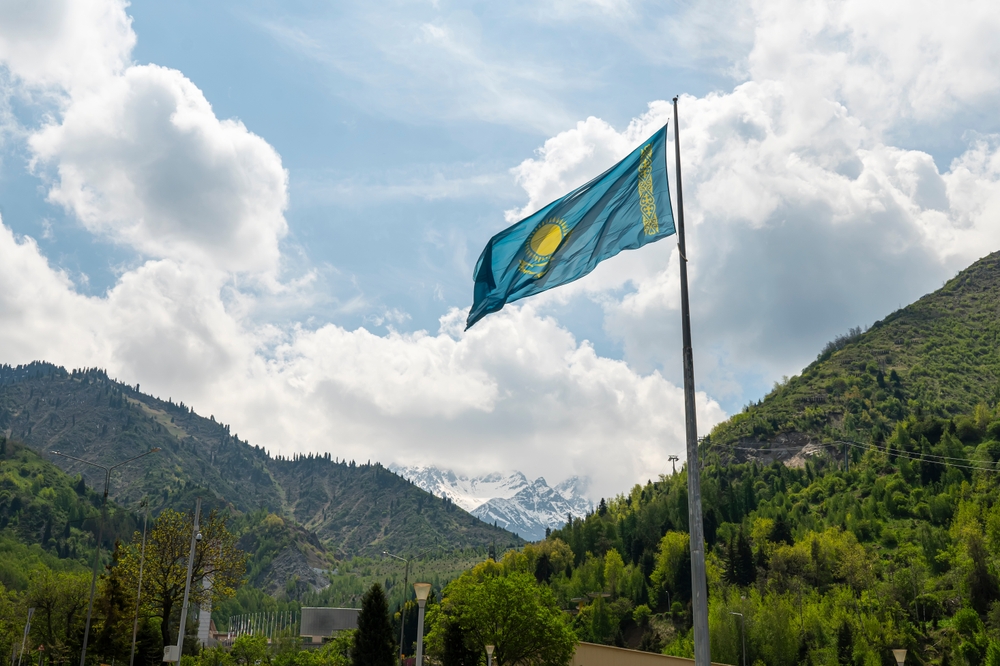Kazakhstan is a land with a proud history stretching back thousands of years to nomadic herders and brave warriors on horseback. It is also, however, a very modern state poised to be the third largest exporter of oil to Europe. It is a country embracing technological innovation and economic diversification, even as it revives its traditional Kazakh language. President Kassym-Jomart Tokayev, an experienced politician, has brought a fresh perspective to the presidency, seeking to implement important reform policies. Kazakhstan is, in many ways, a land at the crossroads.

The flag of Kazakhstan on top of mountain. Photo credit: Melnikov Dmitriy/Shutterstock.
New approaches, like undertaking tax reform and replacing the cabinet, are underway. Will Kazakhstan succeed in its push to attract foreign investment, encourage large-scale projects and double the gross domestic product (GDP)? Will it continue to strengthen ties with Europe or fall prey to logistical challenges? What does the future hold for a vast land still learning to make the most of its resources three decades into independence?
We turned to five distinguished foreign experts for their opinions and reflections on Kazakhstan’s last five years, its current challenges, its relationship with Europe, its role in the Trans-Caspian transportation system, its attempts at diversification and what Kazakhstan’s future might hold. These are Bryn Windsor, a senior analyst at Prism Political Risk Management in London, the U.K.; Nigel Li, Russian and Central Asia specialist at Georgetown University in the U.S.; Marco Beretta, the president of the Italian-Kazakh Trade Association (ACIK) in Almaty, Kazakhstan; Vasilisa Dzehtsiarenka, the CEO of Clever Logistic in Warsaw, Poland; and Wesley Hill, Ph.D., Lead Analyst and International Program Manager: Energy, Growth and Security at the International Tax and Investment Center in Washington, D.C., U.S.
Reflections on the last five years

Assel Nussupova
Marco Beretta said that Kazakhstan, in its efforts towards political reforms and economic progress over the past five years, has undertaken significant steps to modernize its political system and enhance its economic infrastructure, which has resulted in notable advancements.
“In terms of political reforms, Kazakhstan has demonstrated a commitment to democratization and enhancing political participation. Initiatives such as the introduction of greater political pluralism, improvements in electoral processes, and efforts to combat corruption have been commendable. These reforms have contributed to fostering a more transparent and accountable political environment, which is essential for attracting foreign investment and promoting economic growth,” said Beretta.
He also observed, “Economically, Kazakhstan has made significant strides in diversifying its economy and attracting foreign investment, he noted. The country’s strategic location, abundant natural resources, and proactive investment policies have positioned it as an attractive destination for businesses, including those from Italy. Additionally, Kazakhstan has prioritized infrastructure development, industrial modernization, and innovation, which have all contributed to its economic progress.”
Bryn Windsor said that Kazakhstan’s economy “has done remarkably well in the last five years.”
“Repeated crises – the COVID pandemic, the January event of 2022 and Russia’s war in Ukraine – have not made for an easy domestic or external environment. Despite this Kazakh GDP has grown consistently in the last three years (According to IMF: 4.1 % in 2021,3.3% in 2022, and 4.6% in 2023),” he pointed out.
According to the expert, “the growth still remains a long way off what it was in the early 2000s and the economy remains heavily dependent on the oil and gas sector.” As well, he remarked that, “A positive boost will be when the Tengiz Future Growth Project comes online, but again this is still the oil and gas sector. That being said, there are a number of positive renewable projects in the pipeline, such as Svevind and TotalEnergies’ planned projects. We’ll be following these projects to see how they develop.”
Current challenges
Windsor noted that “the government has repeatedly committed to pro-market reform, such as increasing privatization (including through an ambitious IPO programme), decreasing state subsidies and boosting private lending in place of subsidized state loans. For example, in his recent speech on economic policy President Tokayev called privatization ‘a key area of focus’ for liberalization of the economy.”
Windsor further observed, “Overall, I perceive Tokayev’s proposed agenda positively. Recent developments, such as Air Astana’s IPO, Tokayev commitment to a ‘new economic policy’, plans to develop a new Tax Code and changes at the top of the National Economy and Finance Ministries are all positive signs that show commitment to reform. It will be interesting to see how the economic reform agenda develops over 2024.”
Wesley Hill suggested that the biggest areas of concern are economic, especially how to avoid the Middle-Income Trap and diversify its economy through the attraction of foreign direct investment (FDI). Additionally, he pointed out environmental issues, given Central Asia’s problems with long term water security, the Aral Sea, and soil quality.
Relationship with Europe
Vasilisa Dzehtsiarenka spoke about measures to establish an even closer relationship between Kazakhstan and the EU.
“I believe that connections are about specific people and specific companies. Therefore, it would be beneficial to organize as many Kazakh-European events as possible, which would allow people to meet, communicate, and seek mutually beneficial opportunities. The more real business there is at such events, the greater the chances for tangible projects,” she said.
Dzehtsiarenka also sees “strength in enlightenment and promotion, in popularizing Kazakhstan among European companies, as well as the entire Central Asian region.”
“Success stories help draw attention to the country and its potential. I believe the work of European embassies and special government agencies for investment and trade development can play a significant role if there is political will, meaning funding. Bilateral chambers of commerce and industry are also an effective tool,” she added.
The Trans-Caspian Corridor
The experts discussed how Kazakhstan can leverage its geographic position to derive the most benefit from the Trans-Caspian Transport Corridor and other initiatives.
According to Hill, the single biggest action it could take is “to increase its port capacity on the Caspian Sea and work with Azerbaijan to cooperate in this field.” If this happens, Kazakhstan could significantly enhance trade links between China and Europe.
Dzehtsiarenka stated that “Kazakhstan is one of the main beneficiaries of the development of the Trans-Caspian Corridor. The increase in cargo flows and the development of infrastructure will not only create jobs and generate income from servicing the cargo flow directly. Traditionally, where trade routes exist, “life flourishes,” which means other sectors of the economy in the region will develop, investments will be made, and the standard of living in the region will rise.”
She also observed that, “Kazakhstan’s role as a transit country will also increase, marking it as one of the important entities in Central Asia and enhancing its influence. It is crucial for Kazakhstan to initiate processes and take a proactive stance: develop its fleet, engage in negotiations with neighbors on coordinating work to develop the corridor, and also with potential investors.”
Diversification of the economy
The experts also shared their views on Kazakhstan’s efforts to diversify its economy and improve transportation routes to Europe.
“It is a good start, but not enough. Bottlenecks remain on the Caspian Sea for transportation to Europe and until that is resolved, more trade with Europe via the Middle Corridor will remain performative. A good path forward would be both increasing port capacity on the Caspian and realizing some form of under-sea pipeline in the Caspian between Turkmenistan / Kazakhstan and Azerbaijan,” said Hill.
Beretta noted that “Kazakhstan’s efforts to diversify its economy and improve transportation routes to Europe are commendable and strategically important for the country’s long-term economic growth and development. This is important to Europe too. By continuing to invest in infrastructure, promote trade relations, and foster regional cooperation, Kazakhstan can further enhance its economic resilience and strengthen its position as a key player in the Eurasian region.”
Thoughts on Kazakhstan’s Future
Li also shared his vision for the future of Kazakhstan for the next five years.
“I am frankly not optimistic about the trajectory of key geopolitical crises we are facing today. So long as Kazakhstan’s government recognizes that long term planning and pragmatic policies should guide the country’s thinking, then that is a positive start. This is not an easy task, the government must continue to convince its citizens and potential partners that reform and development are Kazakhstan’s priorities. The United States and member states of the European Union are starting to pay attention to what is happening in Central Asia and Kazakhstan is well positioned to be a link between East and West. Realizing projects like the Middle Transport Corridor is a great place to start,” he said.
Beretta’s vision for Kazakhstan over the next five years is “one of continued progress, prosperity, and sustainable development.”
He also stated, “We are committed to further diversifying our economy away from reliance on natural resources towards sectors such as manufacturing, technology, agriculture, and services. This diversification will not only promote resilience but also foster innovation and create new opportunities for businesses and investors.”
He added that the country at present is prioritizing investments in infrastructure, including transportation networks, energy infrastructure, and digital connectivity. According to Beretta, “This will enhance connectivity, facilitate economic growth, and improve the quality of life for all citizens. Embracing emerging technologies and fostering a culture of innovation and entrepreneurship will drive productivity, competitiveness, and sustainable development.”
He shared an upbeat view of the future of the country. “My vision for Kazakhstan is one of a dynamic, inclusive, and forward-looking society that harnesses its strengths and opportunities to achieve sustainable development and improve the well-being of all its citizens. By embracing innovation, fostering collaboration, and prioritizing social and environmental responsibility, we can build a brighter future for generations to come,” he said.
From the author
As Kazakhstan walks the line between old and new ways, balancing challenges and opportunities, it is helpful to explore the perspectives of international experts. The reform-minded Kazakhstan of today is ready to be a player on the world stage and should welcome ideas from near and far that will help it reach its goals for growth and prosperity. After years of being overlooked abroad, it is heartening to see the current growing interest in Kazakhstan from politicians, analysts, and businesspeople in a range of countries.
The author is an analyst holding a Master’s Degree in Economics from Georgetown University in Washington, D.C. With more than 20 years of experience working for the Kazakh government, she specializes in macroeconomics, commodity, financial markets, as well as economic and social policies in Kazakhstan and globally.
